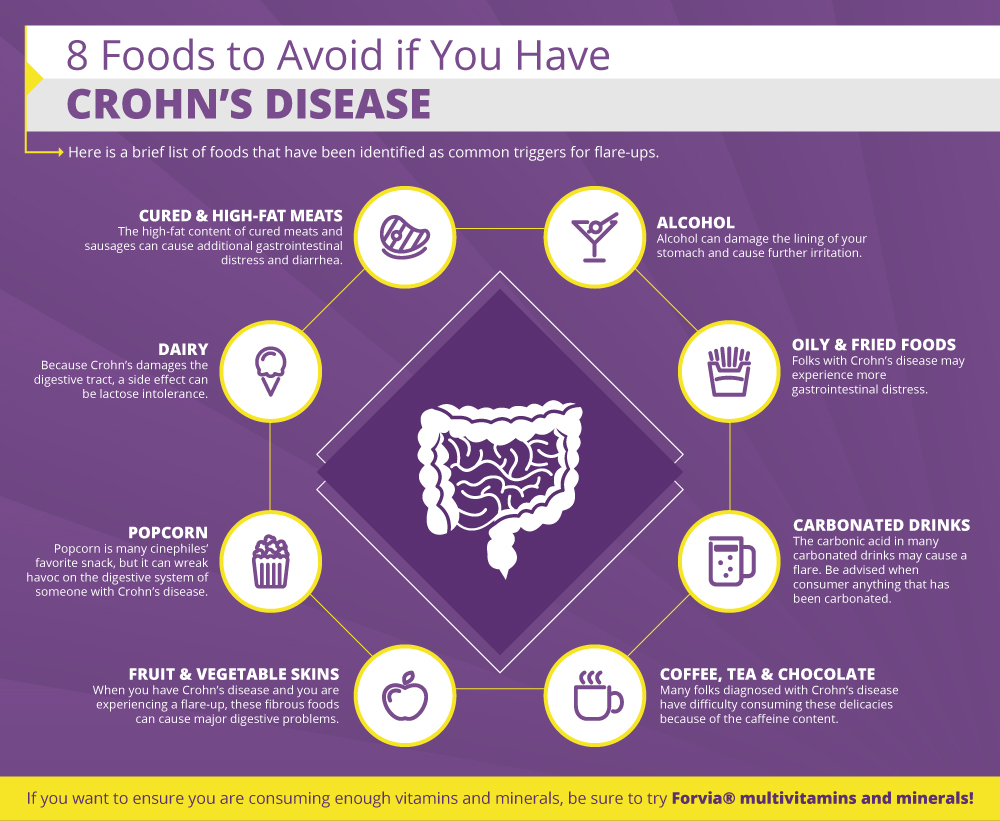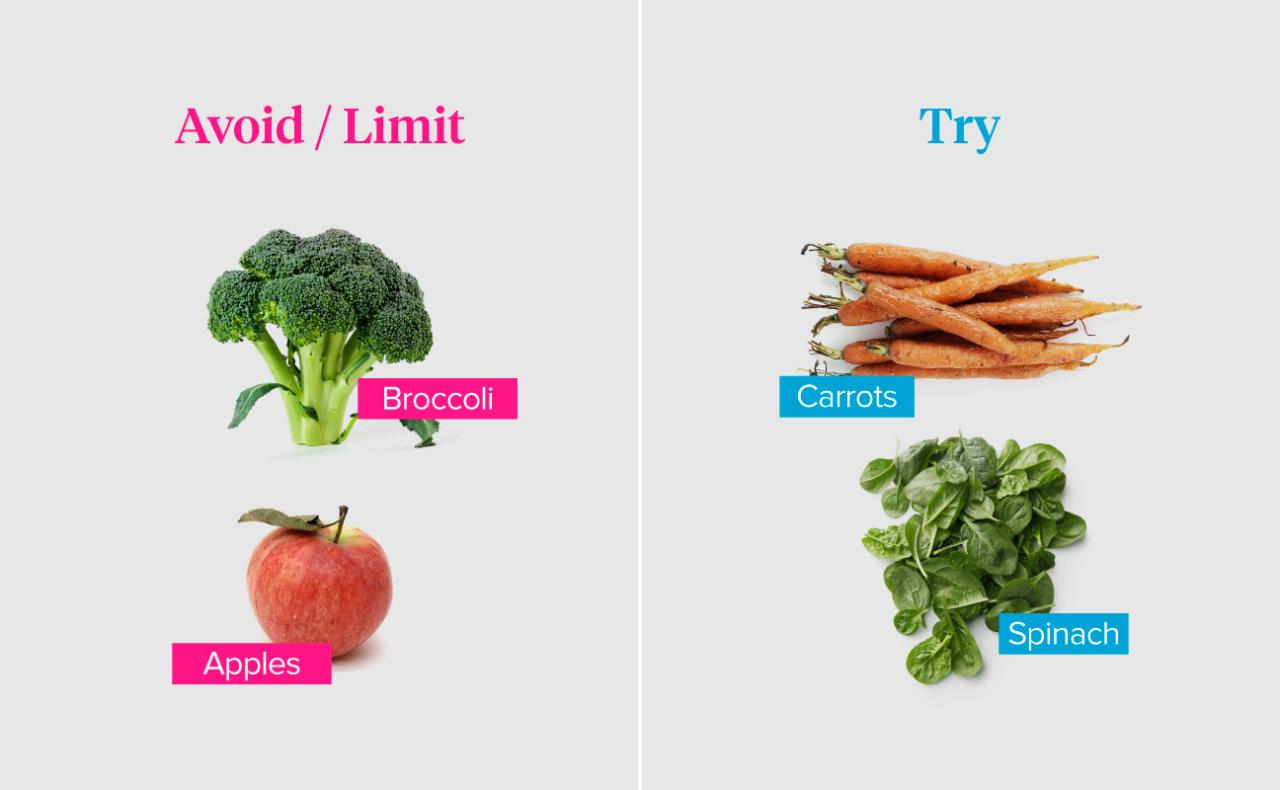Exploring the realm of foods to avoid with Crohn’s disease sets the stage for understanding how dietary choices can impact this condition. As we delve into specific triggers and recommended food restrictions, the intricate relationship between diet and Crohn’s disease becomes clearer.
Common triggers for Crohn’s disease flare-ups
Crohn’s disease flare-ups can be triggered by specific foods that exacerbate inflammation in the digestive tract. It is crucial for individuals with Crohn’s disease to be mindful of their diet and identify potential triggers to manage their symptoms effectively.
Foods to avoid:
- High-fiber foods: Foods high in fiber, such as nuts, seeds, and raw fruits and vegetables, can be difficult to digest and may worsen inflammation in the intestines.
- Dairy products: Dairy can be problematic for some individuals with Crohn’s disease, as lactose intolerance is common among this population. Opt for lactose-free alternatives instead.
- Spicy foods: Spicy foods can irritate the digestive tract and lead to increased inflammation. It’s best to avoid spicy dishes if you have Crohn’s disease.
- Processed foods: Processed foods high in preservatives, additives, and artificial ingredients can trigger inflammation and digestive distress. Choose whole, unprocessed foods whenever possible.
Foods to avoid with Crohn’s disease
Individuals with Crohn’s disease often find relief by avoiding certain foods that can trigger symptoms and flare-ups. By making conscious choices about what they eat, they can better manage their condition and improve their quality of life.
Foods high in fiber
Foods that are high in fiber can be difficult for individuals with Crohn’s disease to digest, leading to discomfort and potential flare-ups. It is recommended to limit or avoid foods such as:
- Whole grains
- Nuts and seeds
- Raw fruits and vegetables
- Legumes
Impact of dairy products
Dairy products can also exacerbate symptoms of Crohn’s disease in some individuals. The lactose in dairy can be hard to digest for those with compromised digestive systems. It is advisable to limit or avoid dairy products such as:
- Milk
- Cheese
- Yogurt
Nutritional deficiencies in Crohn’s disease

Crohn’s disease can lead to nutrient malabsorption due to inflammation and damage in the digestive tract. This can result in deficiencies in key nutrients that are essential for overall health and well-being.
Key Nutrients at Risk
- Vitamin B12: Crohn’s disease can affect the ileum, where vitamin B12 is absorbed. Deficiency in this vitamin can lead to anemia and neurological issues.
- Vitamin D: Reduced absorption of fat in the small intestine can impact the absorption of vitamin D, essential for bone health and immune function.
- Iron: Blood loss from inflammation in the digestive tract can lead to iron deficiency anemia, causing fatigue and weakness.
- Calcium: Malabsorption can also affect calcium levels, leading to bone density issues and increased risk of fractures.
Strategies for Prevention
- Supplementation: Working with a healthcare provider to determine appropriate supplements can help address deficiencies.
- Dietary Modifications: Opting for easily digestible foods and avoiding trigger foods can improve nutrient absorption.
- Regular Monitoring: Periodic blood tests can help track nutrient levels and identify deficiencies early on.
- Intravenous Therapy: In severe cases, intravenous therapy may be necessary to deliver nutrients directly into the bloodstream.
Importance of a well-balanced diet

Maintaining a well-balanced diet is crucial for individuals with Crohn’s disease to manage symptoms effectively and improve overall health. A balanced diet can help reduce inflammation, support gut health, and prevent nutritional deficiencies that are common in Crohn’s disease.
Nutrient-Rich Foods for Gut Health
- Probiotic-rich foods such as yogurt, kefir, and sauerkraut can help maintain a healthy balance of gut bacteria and support digestion.
- Fiber-rich foods like fruits, vegetables, whole grains, and legumes can promote bowel regularity and provide essential nutrients for overall health.
- Omega-3 fatty acids found in fatty fish, flaxseeds, and walnuts have anti-inflammatory properties that may help reduce inflammation in the gut.
- Lean proteins such as poultry, fish, tofu, and eggs can support muscle health and provide important nutrients for healing and repair.
- Vitamin-rich foods like citrus fruits, leafy greens, nuts, and seeds can help prevent nutrient deficiencies and support immune function.
Final Wrap-Up

In conclusion, navigating the landscape of foods to avoid with Crohn’s disease is crucial for managing symptoms and promoting gut health. By being mindful of dietary choices and potential triggers, individuals can take proactive steps towards improving their quality of life.
Key Questions Answered
What are some common trigger foods for Crohn’s disease flare-ups?
Common trigger foods include spicy foods, high-fat foods, and dairy products.
How can keeping a food diary help individuals with Crohn’s disease?
Keeping a food diary can help track potential triggers and identify patterns in flare-ups.
Which nutrient deficiencies are common in individuals with Crohn’s disease?
Common deficiencies include vitamin D, vitamin B12, and iron.